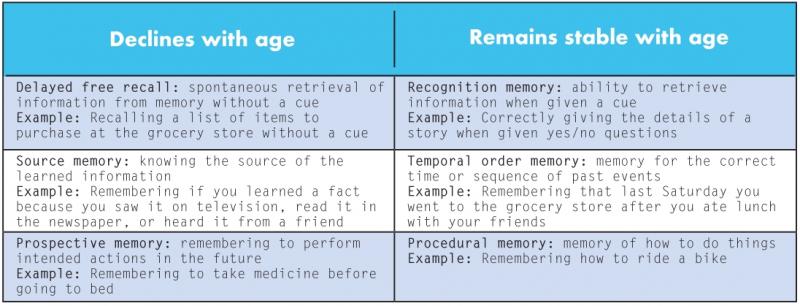The Aging Brain: Normal vs. Abnormal

Small changes can have a big impact on brain health
Aging is inevitable. Just as our bodies change as we get older, our brains also change with cell loss and decreased neurotransmitter production. One of the most familiar and widespread consequences of brain aging is memory change. Interestingly, scientists have identified different types of memory, and some are more vulnerable to the effects of aging than others. The table below shows which types of memory are relatively stable with age and which types are more vulnerable to age-related decline.

What can we do to prevent abnormal brain aging?
All of the things that we have learned about maintaining a healthy body apply to the brain as well. Keep in mind that small changes can have a big impact!
1. Improve your diet. Type 2 diabetes and high levels of LDL cholesterol (sometimes called the “bad” cholesterol) have been linked to an increased risk of Alzheimer’s disease. We all know we should eat better, but making a small change, like drinking water instead of soda or satisfying your sweet tooth with fresh fruit, could have a significant impact on brain aging.
2. Take brain-supporting vitamins and supplements, especially vitamin D, omega-3 DHA and vitamin B12. Low levels of vitamin D are linked to cognitive impairment, and a vitamin B12 deficiency is associated with confusion, depression and poor memory. It has also been shown in studies that a higher intake and higher circulating omega-3 DHA is associated with larger brain volume and a decreased risk of Alzheimer’s disease. These supplements can be found at a local pharmacy and purchased without a prescription, but be sure to always consult with your doctors about what supplements you should be taking.
3. Use it or lose it. Many people work on puzzles and brainteasers, but something as simple as trying something new can do the trick for a brain workout! Change the route you walk or try a new recipe. If you usually play your video game with your right hand, try playing with your left hand. If you modify something that you already like to do, you are much more likely to keep up the good work. The idea is to keep making new connections to maintain brain plasticity.
4. Exercise. Research suggests that exercise is neuroprotective and improves circulation. It also helps with blood sugar and cholesterol (bonus!). You do not have to run a marathon to make a meaningful impact. Things as simple as walking around the block before you pick up your newspaper, parking your car at the end of the parking lot, or skipping the elevator once a day, if done regularly, can positively impact brain aging.
5. Maintain your social network. Strong social ties are associated with a lower risk of dementia, so call a friend or stop to chat with a neighbor. Consider volunteering as a way to create new social contacts (and trying something new!). Countless studies have shown that people who volunteer tend to live longer, happier and healthier lives.
Finally, a valuable tool we have against the inevitable onslaught of age is our brain’s ability to adapt. To maintain function, it may be necessary to adopt new strategies. I keep a detailed calendar with date and time, location and phone numbers of participants as well as notes about what I have committed to do for all of my projects. When I meet new people and they give me their card, I write a note on the back of it describing the connection and any “to do” items. I like to tell myself that I need these new strategies because I have so many projects and meet so many people, not because I am getting old. However, I suspect both are true. Fortunately, technology has made considerable advances in this area. With a smartphone, it is simple to make lists and set alarm reminders about appointments or meds. Also, if you have not tried it, video chatting via programs like Skype or FaceTime can help connect people in a more fulfilling way. Even if you get your grandkids to help you set it up, you still get credit for trying something new.
Memory and Aging
Elizabeth Disbrow, Ph.D., is the director of the Center for Brain Health at LSU Health Shreveport. She is also an associate professor of neurology and teaches in the Department of Pharmacology, Toxicology and Neuroscience.
